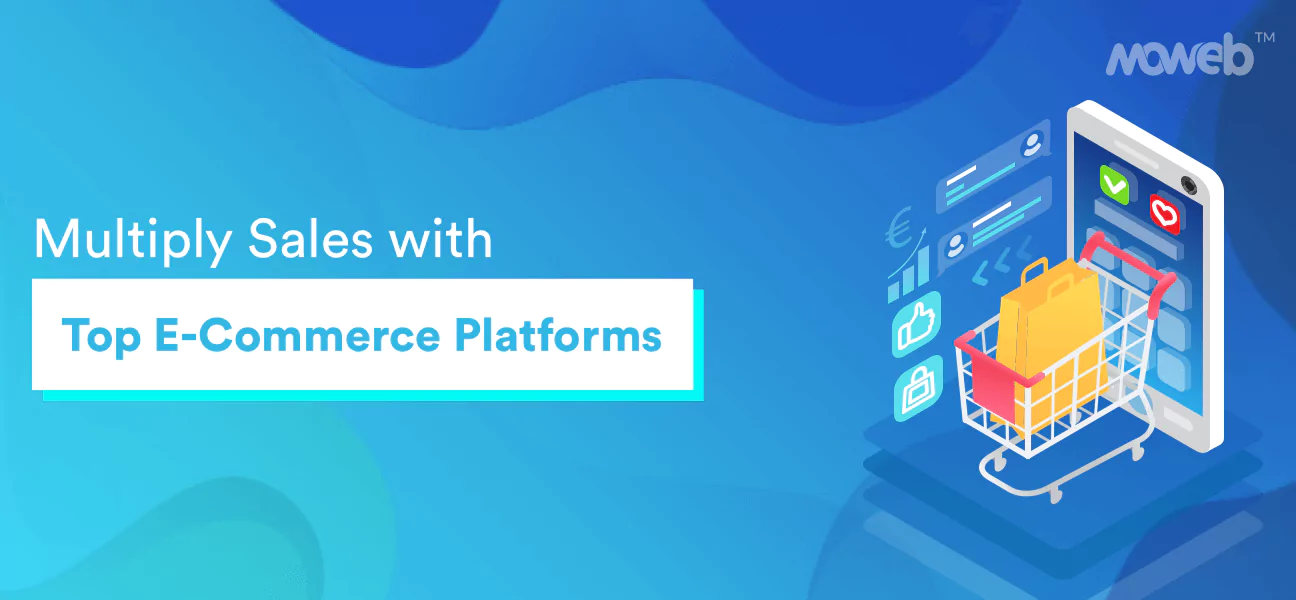
The E-commerce industry is opening new arenas each day, and modern entrepreneurs are constantly striving to surpass their competitors. Business owners are looking to sell their products online by building an online store on the best e-commerce platform. There are several popular e-commerce platforms available in the market that give merchants the chance to develop a robust online e-commerce store to sell products.
Global retail sector technology spending will grow 3.6 percent to reach almost $203.6 billion in 2019, with similar growth rates for the next two years – Gartner
The best e-commerce platform offers all the functions that an online retailer needs at their customers’ fingertips. Hence, choosing the best online store platform from many others is a crucial decision. As different businesses have different needs depending on their business model, sales volume, and an assortment of other factors. Thus, a businessman can determine which e-commerce platform is best for him depending on the size of the business, types of products, budget, functionalities required, target market, and more.
Here Are The Top E-commerce Platform For Modern Retailers To Boost Their Sales
Shopify
Shopify is a powerful e-commerce platform that offers numerous plans for small-medium enterprises as well as large enterprise businesses. It is one of the best e-commerce platforms as it doesn’t demand technical knowledge to operate. Shopify also claims that it’s viable for a user to online stores up and running in minutes.
Besides, users can select from a broad range of templates, or they can design the interface of their online store themselves. It accepts a complete range of credit cards and for security has Level 1 PCI compliance and 256-bit SSL encryption.
It provides customer support 24/7 via email, phone, or instant messaging. Not just that this platform provides a full CMS with which users can manage the layout and functionality of their online store. By using Shopify’s mobile app, users can have a fully responsive store that can be managed on-the-fly. Due to the responsiveness, the store can be accessed by customers from a mobile device or desktop computer.
Shopify also proffers users the benefit of unlimited hosting for their stores, comprehensive marketing analytics of how visitors are using the store, and functionality to optimize SEO using a gift cards, discount and coupon codes, and email marketing campaigns.
OpenCart
OpenCart is one of the simple, open-source e-commerce platforms that are free to download and install. Furthermore, the e-commerce platform comes with a plethora of themes and extensions to make your shopping cart more user-friendly. Also, OpenCart can power a store of any size and can be hosted on any server that meets its system requirements. OpenCart is fast and it runs on object-oriented programming and MVC architecture.
What’s more, OpenCart improves user-friendliness for e-commerce users as it offers analytics, order volume, and payments on the single administrator dashboard. Hence for non-technical users, it’s easy to use point and click interface.
This popular e-commerce platform gives its users more than 10,000 commercial or free themes and modules to use. It is known for its responsive admin UI, active user community, and good documentation.
Magento
Another very popular e-commerce platform is Magento, which is owned by Adobe. This platform is quite secure, customizable, and engaging. It offers products such as business intelligence, order management, and a marketplace to help SME and enterprise-level retailers scale their businesses.
Magento is one such e-commerce solution that offers software for small, medium, and enterprise businesses, but, is extremely suitable for large enterprises. Also, due to its cloud-based services this e-commerce platform offers greater flexibility and agility.
In addition, Magento has unique solutions based on an organization’s, need, size, and domain to support its specific e-commerce goals. For instance, their ‘Magento for travel e-commerce’ platform focuses on creating a spectacular mobile experience for its users. It also provides targeting buying options that primarily fulfill the requirements of retail stores.
WooCommerce
WooCommerce is also one of the most preferred eCommerce platforms across the world. It is a free WordPress plugin that enables eCommerce merchants to transform their WordPress sites into online stores.
The wooCommerce platform has its own secure shopping cart and payment processor. This open-source platform can be an amazing option for small-medium-enterprise brands with WordPress development resources on-hand.
Although it is a free e-commerce platform, integrating a shopping cart would incur additional costs. However, if you wish to have access to a vast community of developers, add-ons, themes, and easy technical support for your website, then consider selecting WooCommerce.
BigCommerce
Another e-commerce platform preferred by many retailers across the globe is BigCommerce. This e-commerce solution is a meticulously designed online interface that helps customers to sell and grow their businesses. A website builder, SEO support, and customizable checkout processes are some of the prominent features of BigCommerce.
With this platform, you get inventory tracking and Amazon integration for making sales easier. BigCommerce also proffers other integrations such as – Instagram shopping, MailChimp, Google Shopping, and more which makes reaching your target audiences where they are a seamless process.
You do not need high coding experience as BigCommerce supports ready-made templates that can be modified as per your need. Known for its fast processing speed, BigCommerce is specifically advantageous for new companies looking to showcase their brand as trustworthy and speedy.
Squarespace
Squarespace is also one of the e-commerce solutions known for its smooth and easy-to-use web page builder. This software is a groundbreaker in website designing and proffers drag-and-drop templates to create an attractive online e-commerce store. You can either customize your site or use Squarespace’s ready-made designs to create one. Best of all, the Squarespace tool supports businesses through fail-proof domain strategies and SEO best practices to increase brand identity.
Not only that but, organizations can also strategize email campaigns using Squarespace. They can connect with consumers using social media integration, and track the behavior of website visitors. Also, Squarespace helps artists, entrepreneurs, restaurants, and various other customers to create a stunning and professional e-commerce online store.
Wix
Wix is a super simple e-commerce platform that offers features for small online businesses. You can pick from more than 500 sleek templates or develop custom web applications from start using Wix. It offers its builders a serverless, hassle-free coding integration such as a blog, personalized SEO, galleries, and a custom domain to make a beautiful and operational e-commerce store.
You can get a variety of e-commerce functionalities and an intuitive interface for a reasonable price by opting for Wix. It’s more effective for smaller businesses, however, it’s somewhat difficult for larger businesses who wish to scale up as it lacks multiple sales channels and some other multifaceted features.
The Final Say
Remember, building an online store should be approached very judiciously and after thorough research to make sure that you put a professional and successful site live. These days’ internet shopping is constantly expanding, so ensure that your business doesn’t lose out on a sales channel that shows no signs of deceleration.
These are just some of the best e-commerce platform that integrates a collection of tools that tracks a lead’s lifecycle as they convert from prospect to delighted customer. You can capture, track, and analyze leads to drive conversions easily. If you want to develop your e-commerce store with rich features, get in touch with our experts.
Found this post insightful? Don’t forget to share it with your network!



